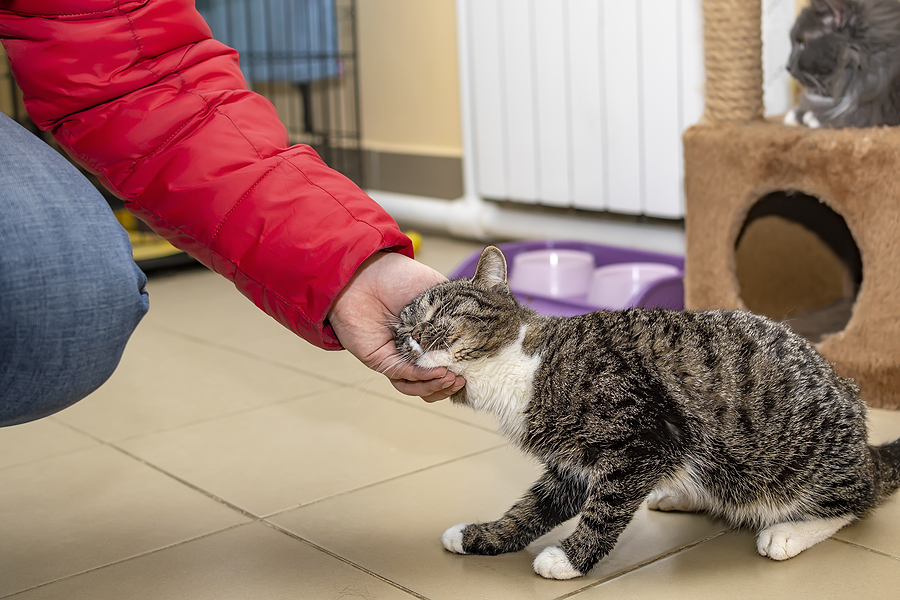“Sinjin may be the world’s luckiest cat. He was burned from head to foot by caustic chemicals, and unable to move when he was found in a driveway. This fat and happy one-eyed pirate now rules over the cat kitchen, demanding treats at all hours.”
This was the description I received — along with a 5-by-7-inch photo — of the first cat I ever sponsored from an animal shelter. Several years and numerous sponsorships later, becoming a sponsor to homeless (and often hard to adopt) cats has changed my life.
How Sponsorships Work
Sinjin didn’t live with me in my home. In fact, he lived on the other side of the country, at Best Friends Animal Sanctuary in Kanab, Utah. I never met Sinjin, but it warmed my heart knowing I was helping to make his life more comfortable.
Pets in these programs may have difficulty finding a home because of behavioral problems, physical problems such as diabetes or other special needs, or a combination of the two. Sponsorships help shelters care for them until they’re adopted or meet their needs if they live at the shelter for life.
Sponsoring a cat is the perfect solution if you love cats but cannot keep one because of severe allergies, “No Pets Allowed” rental agreement policies, or inability to care for the pet. A sponsorship is also a great way to “give” a cat to a fellow cat lover who may not be able to keep one for similar reasons. You can choose the sponsored cat yourself or, better yet, let the recipient look through the photos and descriptions and pick their favorite.
Who Sponsors Cats
Lindsi Jones, author of Cats in Bow Ties, owns Lindsi Jones Photography. For wedding shoots, she came up with a unique gift idea for the happy couple.
“I would sponsor a cat from the shelter I work for, Miss Kitty Feline Sanctuary, in Thomasville, Georgia. Every time I shot a wedding, I would sponsor a cat on behalf of that couple — I would then send them a picture of the cat with that kitty’s information. I donated enough to cover the adoption fee so that if someone came in and wanted to adopt that cat, the fee was paid on behalf of the newlywed couple. I would pick a cat that had been there for a long time.”
Dawn White, author of Lola: Diary of a Rescued Cat and blogger at Lola: The Rescued Cat sponsors a cat from Tabby’s Place. The mission statement at the Ringoes, New Jersey, shelter reads: “Tabby’s Place rescues cats from hopeless situations. We embrace the neediest cats regardless of age, most medical issues, or temperament, making us a harbor of hope for the most desperate. Most of our cats go on to be adopted; but those who aren’t find a loving home for life at Tabby’s Place.”
White says: “When I first visited Tabby’s Place in 2011, I fell in love with the sanctuary. I was so impressed with the work they do and with the fact that if a cat isn’t adopted, they still have a home forever.”
Sponsors receive monthly updates on their sponsored cat and may even be able to visit them if they live in the area. That’s a good idea, if you’re local, for more reasons than just getting to visit some sweet cats.
Vicki Thayer, DVM, DABVP (feline), owner of Purrfect Practice PC, in Lebanon, Oregon, says, “Many animal welfare groups, shelters, and rescues offer sponsorships of pets. I strongly recommend ensuring these services can be delivered effectively. To avoid potential animal hoarding situations, pet lovers should check references, local regulations, nonprofit status and, if possible, inspect the facility.”
Sponsoring Is Special
White, who currently sponsors a cat named Rose, says sponsorships have enriched her life. “I consider Rose to be a part of our family, and I’m happy that my monthly donation helps her with her medical care and helps Tabby’s Place give her (and the other cats) all they need to live an enriched and happy life.”
Knowing that you can help unfortunate animals is a feeling beyond compare. Whether your furry friend is curled up on your lap as she waits for a new home or is a thousand miles away being cared for and loved by strangers because of your generosity and sponsorship support, it means the same thing to all of these pets: safety and hope.
This article was reviewed/edited by board-certified veterinary behaviorist Dr. Kenneth Martin and/or veterinary technician specialist in behavior Debbie Martin, LVT.








